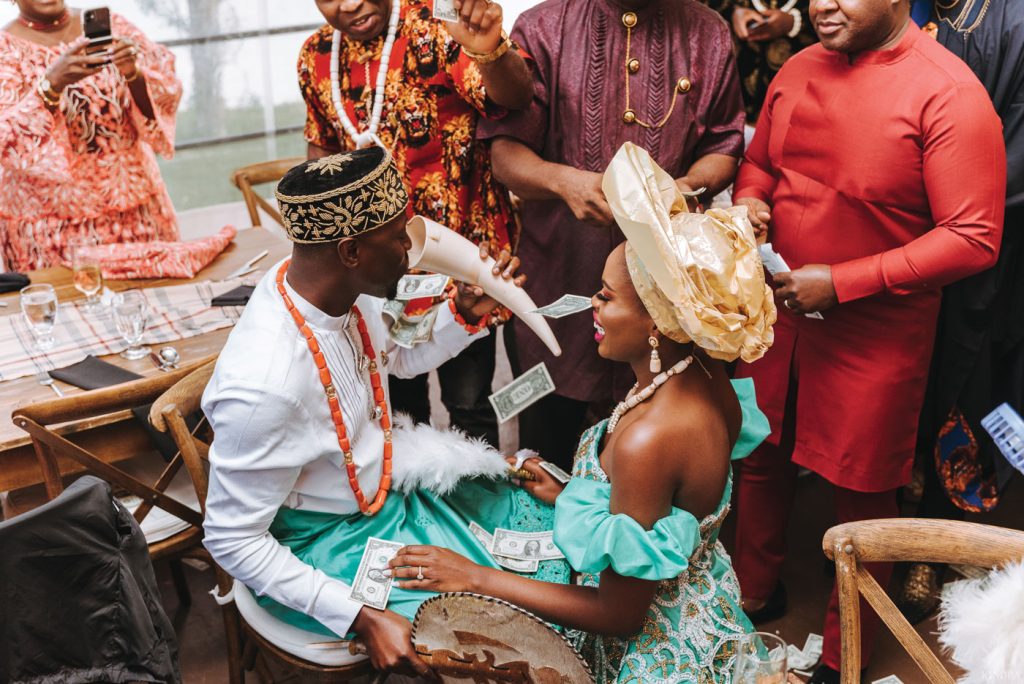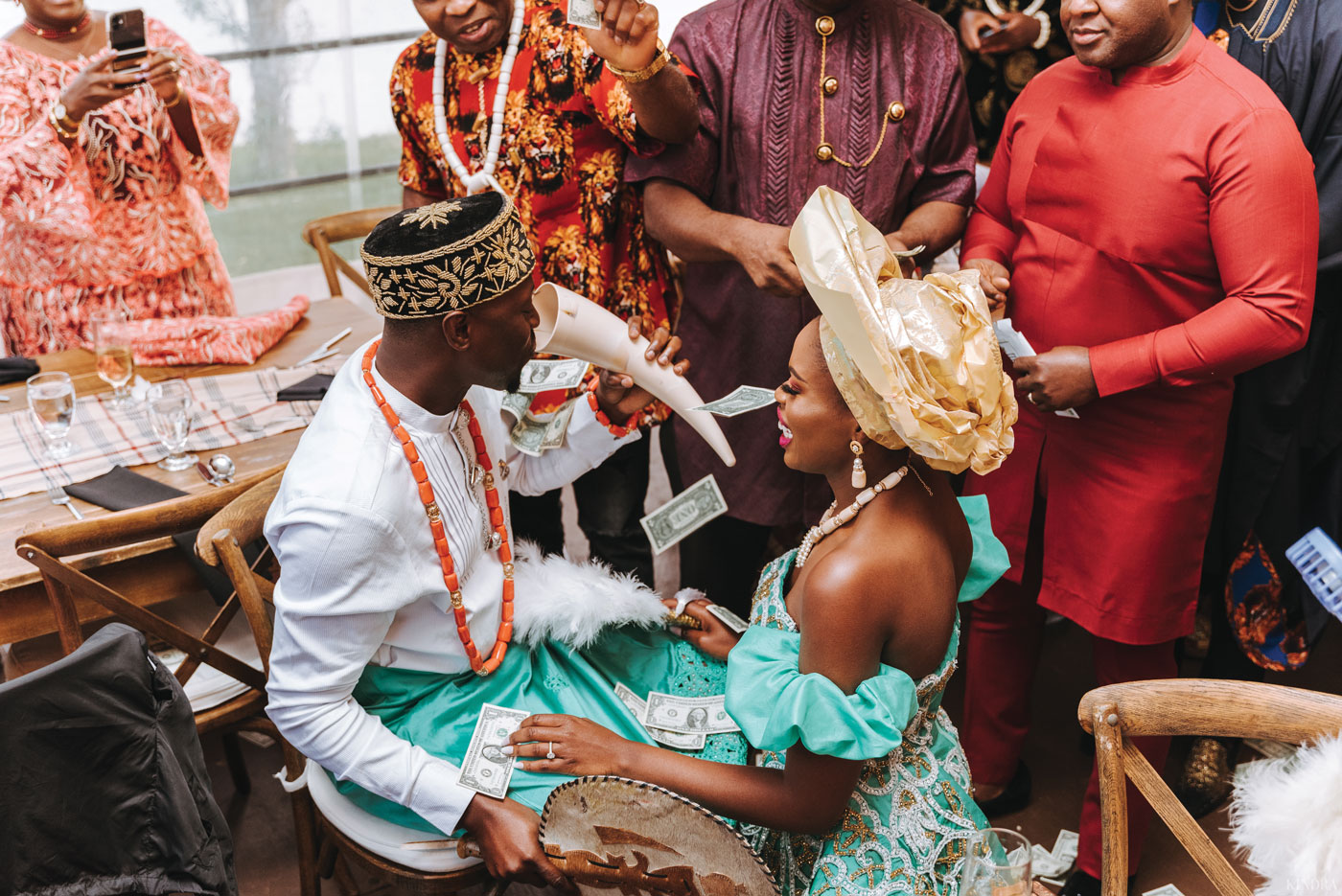
1. Introduction: The Philosophical Bedrock of Igbo Marriage
In the Igbo culture of Nigeria, marriage is fundamentally understood as a contract between two families, not merely two individuals. This perspective contrasts sharply with many Western traditions, where individual consent is the primary determinant of a marital union. For the Igbo people, the union is so deeply communal that an individual cannot enter into a marriage without the express permission of their parents; to do so would invalidate the marriage, rendering it a “mere friendship without any form of legitimacy” in the eyes of the community. Consequently, the traditional wedding ceremony is a grand, multi-stage affair where parents, extended family members, villagers, and even townsfolk play an active and indispensable role in affirming and solemnizing the union.
The intricate process is anchored in a kinship system that elevates the marriage beyond the nuclear family. The male-led extended family, known as the Umunna, and the female-led cohort of married daughters, the Umuada, hold significant authority. A suitor must ask for the bride’s hand not only from her parents but also from the elders of her
Umunna, and the bridal list includes specific offerings for both the male and female kindred groups. This widespread family involvement serves as a profound mechanism for social and cultural legitimacy. By securing the consent and blessings of the entire lineage, the groom is not just acquiring a wife; he is being ceremonially accepted into a new, supportive kinship network. This framework provides a form of social insurance for the bride, ensuring her well-being is a collective responsibility of her new family.
2. The Ceremonial Journey: Stages of the Traditional Wedding
The traditional Igbo wedding is a sequential journey, often spread out over several visits and weeks, each with a distinct purpose and name. This process, while lengthy, is a deliberate and meaningful progression from a private intention to a public declaration of a new family bond.
| Igbo Name (English Translation) | Primary Purpose | Key Actors | Research Sources |
| Ikụ Aka n’ Uzo (Knocking on the Door) | Formal introduction and statement of intent. | Groom, his family, bride’s parents. | |
| Ijụ Ajụjụ (Family Background Investigation) | Confidential due diligence on both families’ character and history. | Both families and their communities. | |
| Ihu Isi Nwanyi (Discussion of Bridal List) | Formal presentation of the customary gift list to the groom’s family. | Bride’s family, groom’s family. | |
| Ego Isi Nwanyi (Dowry Negotiations) | Discussion and payment of the symbolic bride price and other gifts. | Negotiators from both families. | |
| Igba Nkwu (The Wine Carrying Ceremony) | The public celebration and official solemnization of the marriage. | Bride, groom, both families, and guests. | |
| Idu Ụlọ (New Home Sendoff Gifts) | The bride’s family provides gifts to help the newlyweds start their home. | Bride’s family, the newlyweds. | |
| Imata Ụlọ Di (First Visit to Newlywed’s Home) | The bride’s family visits her new home to confirm her happiness and well-being. | Bride’s family, the couple. |
2.1. The Knocking on the Door (Ikụ Aka n’ Uzo)
The journey begins with this ceremonial visit, which is considered the “first and compulsory process”. The groom, accompanied by his parents, elders, and other close relatives, visits the bride’s home with gifts such as alcoholic beverages and kola nuts, a customary sign of welcome. The groom’s father formally announces their intention to seek the bride’s hand in marriage. The bride’s father, in turn, acknowledges the visit and states that he will “speak with his daughter and get back to them”. An immediate answer is not expected, and the visit concludes after the families share food and drinks. The act of “knocking” and deferring to the bride’s family is a profound act of humility and respect. It acknowledges that the woman is a valued member of her family and that her hand must be “sought honorably”. This public display of deference sets a tone of goodwill and respect that is crucial for the entire marital relationship.
2.2. The Family Investigation (Ijụ Ajụjụ)
Following the initial visit, both families embark on a confidential and often secretive due diligence process. They conduct separate inquiries about each other’s origins, character, social standing, religious practices, and even general health. This investigation is performed through external sources within their respective villages and towns, often without the couple’s full awareness. The groom may begin his inquiry before the first visit, while the bride’s family typically starts theirs afterward. This phase of the wedding is not just a formality; it is so crucial that any negative discoveries can “delay or stop the marriage” entirely. The investigation serves as a pragmatic effort to mitigate risks for the entire lineage. By vetting the prospective family, the community ensures the continuity and well-being of their collective bloodline, underscoring that marriage is a merger of lineages with long-term implications.
2.3. The Bridal List & Bride Price Negotiation (Ime Ego & Ihu Isi Nwanyi)
Once the families are satisfied with their investigations, a follow-up visit is scheduled to discuss the bridal list. This “customary list” is provided by the bride’s family and contains a wide array of items that the groom is expected to provide, including yam tubers, bags of rice, alcoholic drinks, clothing, and livestock like goats or cows. The items on this list are considered “sacrosanct and incontestable,” and any failure to fulfill the requirements could “jeopardize the union”.
Simultaneously, the bride price, known as Ime Ego, is negotiated. Contrary to popular misconception, the monetary bride price is typically a “relatively small” and symbolic amount, sometimes as little as N20-N40 or N10,000-N15,000, and is often a subject of negotiation between the families. This duality—a small, symbolic monetary price juxtaposed with an extensive, costly list of goods—is not a contradiction. The core of this tradition is that the monetary bride price is a ritualistic token, while the true demonstration of commitment and value lies in the provision of the extensive list of goods. This tangible act publicly demonstrates the groom’s ability to provide, serves as a gesture of gratitude for the bride’s upbringing, and contributes to the wedding feast. In a modern evolution of the tradition, the bride price may be higher for a woman with a university education, which acknowledges the family’s financial investment in her.
3. The Language of Objects: Symbolism and Meaning
3.1. The Bride Price: Beyond a Transaction
The bride price, or dowry, is a “revered custom that transcends mere material exchange”. It is described not as a transaction, but as an “emotional bond woven between families” , a demonstration of the groom’s sincerity and appreciation for the bride’s family raising a “wonderful daughter”. The payment of the bride price is considered a fundamental pillar of the marriage. It is the “only marital right which is generally accepted in all Igbo tradition to solidify marriage, without which there was no marriage”. The profound significance of this ritual is that it is the legal instrument that transfers a woman from her family’s authority to her husband’s lineage. Without the payment of the bride price, any children born to the couple are not recognized by the husband’s family, effectively rendering the union illegitimate in the eyes of the community. The bride price thus functions as a legal and social guarantor, providing the woman with honor and a “sense of community value amongst her peers”.
3.2. The Palm Wine: A Liquid Vow of Unity (Igba Nkwu)
The Igba Nkwu, or wine-carrying ceremony, is the central and most significant part of the entire traditional wedding. The celebration, hosted by the bride’s family, culminates in this symbolic ritual. The bride’s father gives her a cup of palm wine, publicly endorsing the union. She then, with her bridal train (
Asoebi), dances through the crowd of guests to find her groom, who is “hiding among the guests”. This public “hunt” is a playful yet serious test of her commitment, a moment where she must publicly choose him from a crowd of distractions. Upon locating her fiancé, she kneels and offers him the cup of wine, a gesture that symbolizes her acceptance and respect for him and his family. The groom’s acceptance and drinking of the wine is the final, irreversible act of consent, witnessed by the entire community. He then places money in the cup as a token of his commitment and generosity. The couple then kneels before the bride’s father to receive his final blessings and words of advice.
3.3. Gifts and Offerings: The Bridal List Demystified
The gifts on the bridal list are not a random assortment of goods; they are a social and spiritual ledger that acknowledges the various segments of the bride’s community. The offerings of goats, yam tubers, rice, and a predetermined number of drinks are for the bride’s parents, the men of the kindred (
Umunna), the women (Umuada), and the youth. The items presented serve a dual purpose: they are a pragmatic contribution to the grand feast and a symbolic form of appeasement and respect. The inclusion of traditional items like tobacco and snuff is particularly meaningful, as these substances have a deep ritualistic significance in African cultures, often used in dealings with ancestral spirits to secure their blessings for the union. Thus, the bridal list is a comprehensive social contract that ensures the union is sanctioned by the living community and blessed by the ancestors.
3.4. The Fabric of Identity: Attire and Adornments
Attire at an Igbo traditional wedding is a powerful visual narrative of identity and unity. The groom often wears a red cap and Isi Agu fabric, which features a lion head motif that symbolizes “courage, strength, and resilience”. This outfit publicly declares his Igbo identity and his new status as a man of substance. The bride, meanwhile, often changes her attire multiple times throughout the ceremony, with her outfits reflecting her transition between different stages and societal roles. She may be adorned with coral beads, which symbolize royalty and marital bliss, and an intricately tied
Gele headwrap, which is a statement of grace. A unique and communal tradition is the use of
Asoebi, or matching fabrics worn by guests. The
Asoebi transforms guests from passive observers into a collective statement of support, creating a visually unified ensemble that symbolically embraces the new couple into a larger communal tapestry.
4. The Grand Spectacle: Celebration, Cuisine, and Art
4.1. The Wedding Feast: A Tapestry of Igbo Cuisine
The culmination of the marriage rites is a vibrant celebration marked by music, dance, and a lavish feast. The preparation of a wide variety of Igbo dishes is the responsibility of the bride’s family and is a central component of the festivities. The menu typically includes an array of delicacies such as Jollof rice, fried rice, pounded yam with traditional soups like
Egusi or Efo Riro, and popular finger foods known as “small chops”. The sheer scale and variety of the feast are a direct reflection of the family’s honor, pride, and prosperity. The sharing of food and drink is a communal act that reinforces the family’s social standing and their commitment to celebrating the union with everyone in attendance.
4.2. Music and Dance: The Rhythmic Narrative
Music and dance are integral to the wedding ceremony, acting as a dynamic backdrop to the rituals. During the wine-carrying ceremony, for example, the music sets the pace for the bride’s search for her groom, building anticipation and joy. Beyond entertainment, the songs themselves are a form of social commentary and counseling. The lyrics are deliberately crafted with linguistic features like humor, repetition, and imagery to “pass messages to the newly married couples” about societal expectations and values such as patience, unity, and generosity. The dances, such as the energetic
Atilogwu performed by young people, are a vibrant, rhythmic embodiment of the culture and its joy.
5. A Modern Evolution: Continuity and Adaptation
5.1. The Blended Wedding
In contemporary times, it has become increasingly common for Igbo couples to combine their traditional wedding rites with a Western-style “white wedding”. This practice reflects a dual cultural identity and a pragmatic approach to modern life. While the traditional ceremony, with its family-centered rituals, is considered the “real” marriage by many in the community, the “white wedding” provides the legal recognition required in a Western context. The two ceremonies are sometimes held on the same day to accommodate busy schedules, demonstrating an adaptation that preserves cultural heritage while embracing contemporary convenience.
5.2. Variations by Region and Diaspora
Igbo traditions are not monolithic; they are a living, evolving practice that varies by community and region. While the core mechanics of the wedding process remain the same across Igboland, details such as the specific items on the bridal list, their quantities, and the amount of the symbolic bride price “differ slightly amongst different parts”. These regional variations confirm that traditions are not a static rulebook but are fluid and adaptable to local norms, economic realities, and the unique circumstances of the families involved.
5.3. Evolving Roles: Navigating Gender and Modernity
A significant modern evolution is the shift in how couples are chosen. Traditionally, parents and women, in particular, had a “powerful and active behind-the-scene role” in matchmaking. Today, it is more common for the couple to find each other and then “go and inform their families” of their decision. However, the “absolute rule” of seeking parental consent and family involvement remains non-negotiable. This represents a powerful compromise between tradition and modernity: the family’s role has evolved from arranging the union to affirming and blessing a choice that has already been made by the couple, thus preserving the value of communal involvement while granting greater individual agency.
6. Conclusion: The Enduring Legacy of an Ancient Tradition
In conclusion, the traditional Igbo wedding is far more than a simple ceremony; it is a meticulously choreographed, multi-stage process that serves as a public and legal validation of a new social, spiritual, and economic contract. Each ritual, from the humble act of “knocking” to the vibrant wine-carrying ceremony and the public feast, serves to solidify the bond not just between two people but between two entire communities. The symbolism embedded in every aspect, from the gifts and offerings to the ceremonial attire and songs, reinforces the core values of family, community, respect, and legitimacy. While modern adaptations, such as the blending of traditional and Western ceremonies, demonstrate the culture’s dynamism and practicality, the fundamental principles of communal consent and familial unity remain the bedrock of the institution. Ultimately, the Igbo traditional wedding is a profound and enduring testament to a culture that views marriage as the sacred covenant of a community, a living tradition that continues to flourish by honoring its past while embracing its future.






